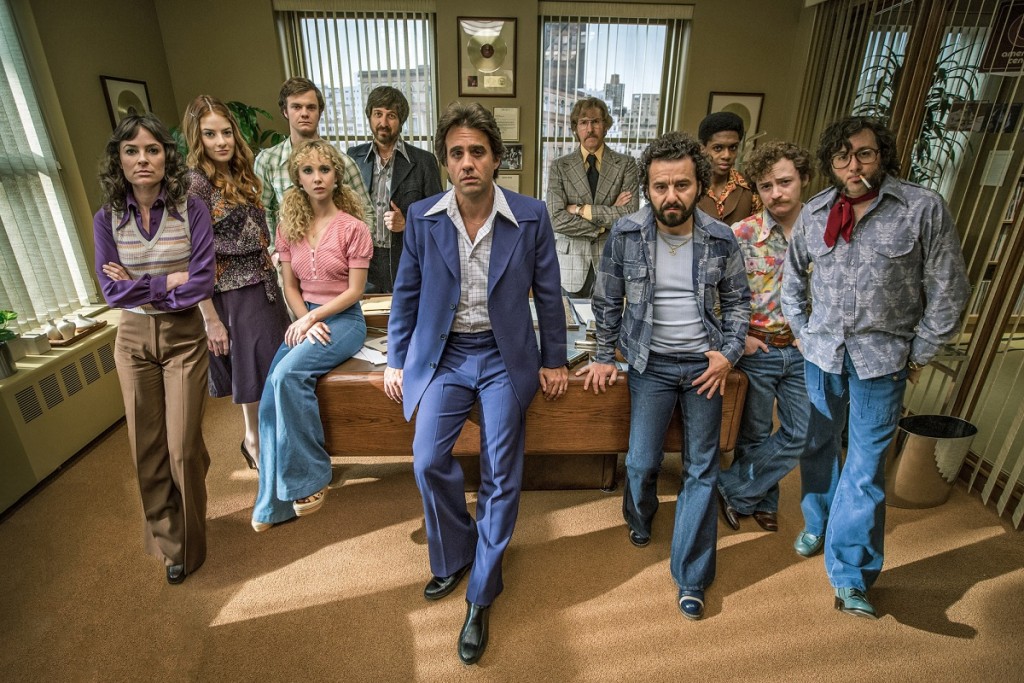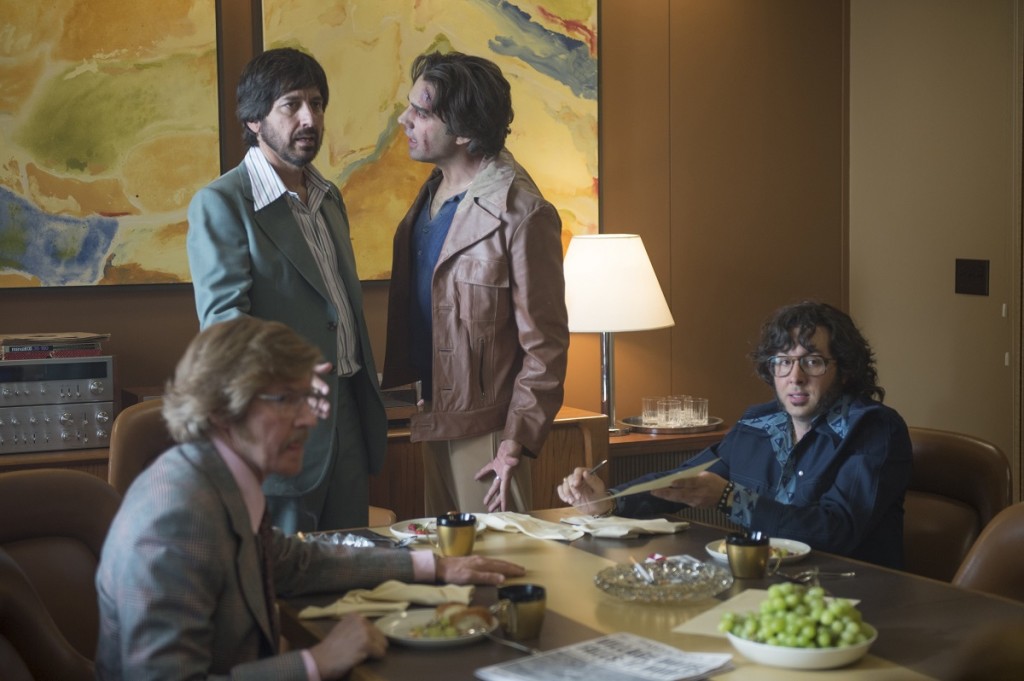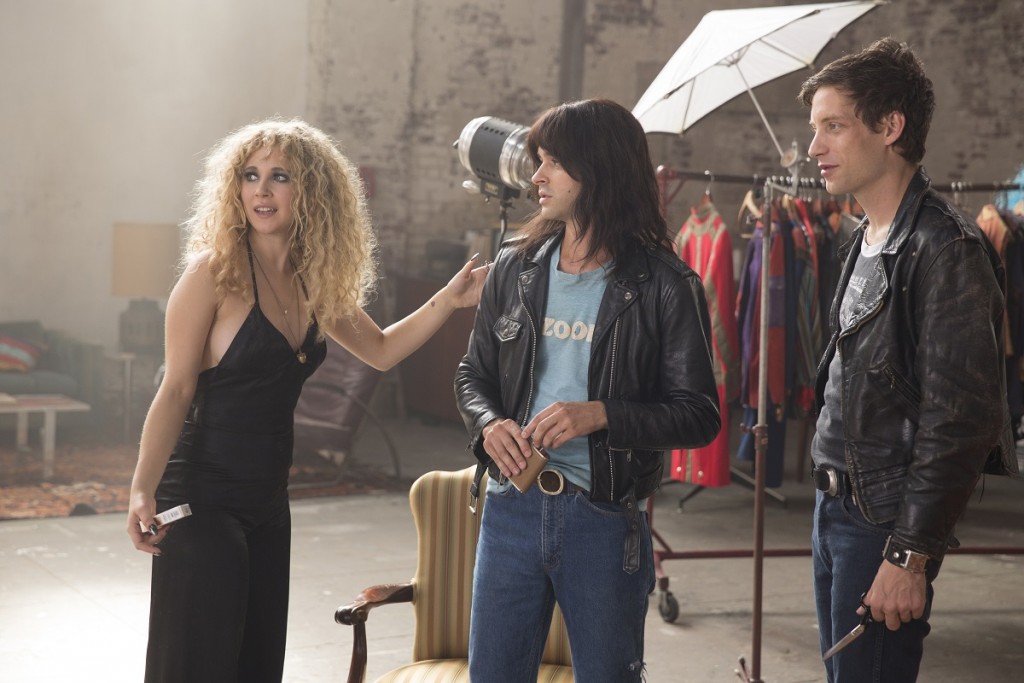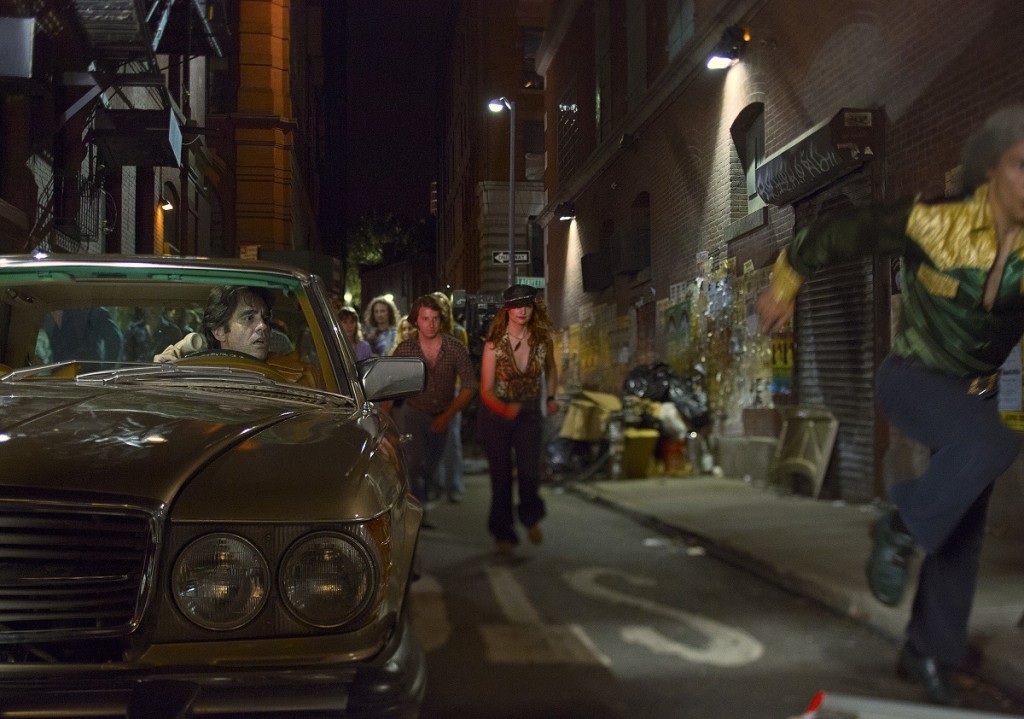J.C. MacKenzie on Playing Skip Fontaine on HBO’s ‘Vinyl’ And What He Thought the Show Would Originally Be Called

Pictured: Mackenzie Meehan, Emily Tremaine, Jack Quaid, Juno Temple, Ray Romano, Bobby Cannavale, J.C. Mackenzie, Max Casella, Griffin Newman, P.J. Byrne in “Vinyl.” Photo Credit: HBO.
You know J.C. MacKenzie. He’s outspoken, candid and has a penchant for playing unctuous and unsympathetic characters. Although a major portion of his work is episodic, he takes each of his roles seriously, etching his expressive performance in your mind. From a stint in Law & Order: Special Victims Unit as Brian Ackerman to an appearance as Phil Langdon in Netflix’s hit, House of Cards, his face is a familiar one.
Not ringing a bell yet?
For those who have a Netflix subscription, chances are you’ve seen him flex his acting muscles in the spine-chilling original series Hemlock Grove as Dr. Arnold Spivak, the Godfrey’s family doctor (not to be confused with his role on Murder One). And on February 14, America watched him take the screen yet again in the new HBO series, Vinyl.
With over 150 credits to his name, (don’t believe us? Check out IMDB!), and a career that gets better year after year, it is no wonder he is becoming a major sought-after talent. But he is interested in only one thing: the thrill of the performance. “I care enough about money to have enough to live off, but I just want to work with good people. That’s the only thing that has ever really kind of excited me,” he says in an exclusive interview with GALO.
Earning a coveted series regular role as Skip Fontaine on the highly-anticipated Martin Scorsese and Mick Jagger production is no feat to be taken lightly, and one that MacKenzie has worked tirelessly for. It’s no secret that Hollywood has been chewing up and spitting out actors “of a certain age” since the dawn of time, and so MacKenzie knows all too well the rocky ground he is on, battling younger versions of himself during casting calls for a chance in the spotlight. However, that rocky ground has become a little more solid, and with the right people and a whole lot of talent to back him up, this could be the role that defines his career.
Read on to find out what MacKenzie had to say about his time on the set of “Vinyl,” what he thinks of the younger actors involved in the series, and what made him want to be a part of the show in the first place.
GALO: You’re known for a lot of episodic work over the course of your career. Is there any character you wish you had more time to develop?
J.C. MacKenzie: Yes. I mean, I like anything dark. I like to play really creepy, bad people — I think it’s more interesting. The hardest thing you can do is act nice. I mean, I’m nice in life, but when you’re doing it on a television show or [in] a movie and don’t have anything but that, then you have nothing to grip onto. Whereas if you have a fully fused, three-dimensional nuanced human being, who is neither good nor bad but just human and filled with the emotions that we all have, then it’s much easier to tap into that stuff. That comes through the writing. You only get those opportunities through projects that are well-written. A lot of these things that you see are completely blunt and two-dimensional.
You’re not intentionally evil. We’re human beings and we try doing the right thing, but we’re often confused and mixed up. And I think you’re seeing that more and more, particularly on these long-form television shows which are now becoming the thing that everyone wants to do. I don’t know what’s happened in film, but everyone has sort of shifted to television to tell these intricate stories. It’s an interesting time we’re in.
GALO: Why do you think that is?
JCM: I think it has a lot to do with cable, actually, and that’s informed networks. I think it has partially to do with reality TV and the style of acting. When I first started acting, I couldn’t act in half the things I was cast in because it was so broad. Now with reality TV, you see the way human beings react, and so there is less of a divide between reality and fiction. That’s what [Martin] Scorsese does so well. This line between documentary and fiction becomes very narrow, so you get these performances by actors who are saying these wonderful lines, but it’s much more spontaneous than it has been in the past. For me, that’s the most exciting work. If I [could] do that, [then] that is all I would do.
GALO: In recent years, you have played the role of Dr. Arnold Spivak in the Netflix series Hemlock Grove. What have you found are the differences with shows that stream all the episodes at once, as opposed to a TV show that airs weekly?
JCM: I had no reaction to it until I was involved. I did an episode of House of Cards — I just did one episode — but because it’s dumped at the same time, it’s like watching a very long movie. That’s a great series, House of Cards, so people picked up on it, and I got a weird amount of response on that. That was my first experience with these shows that come out at the same time. Hemlock Grove, too — it’s pretty remarkable.
The first weekend, I was in a subway in New York, and I really don’t get recognized that much, but all sorts of people in the subway were pointing at me. And it’s a little disconcerting at first, because you don’t know what they are pointing at, but they’ve seen the show… You feel it more with something like these shows that come out at the same time, as opposed to something that may go from week to week [or] month to month, depending on when it’s aired.
Hemlock Grove came about because Charles H. Eglee, who was the showrunner for it, called me into his office and said, “I’m pitching you to the head of Netflix to play this evil, seemingly genial doctor who is actually the devil incarnate.” I said, “Wow! That’s great!”
It’s weird — I’ve been at this more than 30 years, and it’s sort of a young man’s game. The opportunities you get now are the ones that I sort of forged creatively with these people in my earlier years, and now it’s kind of paying off. They’re saying, “Let’s get J.C. in.” I mean, that’s often how I get episodic work, too. I just sort of get it offered by people who are on shows that I was a series regular on. They may have been junior writers back then, but now they’re running these shows.
The auditions, interestingly, are less the older you get because there are less roles. The guys I’ve seen in [audition] rooms, a lot of these guys have been nominated for Academy Awards or they’ve won Tony Awards. They are named men who I am competing against, and if it were up to me, I’d give the role to them. That’s what the business is like the older you get. The pool gets smaller and smaller because there are fewer and fewer roles.
[pullquote align=”right” cite=”It’s a good flow, man! It’s like being in a Maserati — like being in a very high-powered sports vehicle that’s well-engineered and that executes, and you just kind of go along with the ride. ” link=”” color=”#ff0000″ class=”” size=”15″][/pullquote]
GALO: In an interview earlier this year, you said you thought your new HBO show would be called “Rock & Roll.” How did the name Vinyl come about?
JCM: I think the writers got together in a small room with Terence Winter, the showrunner and creator, and they all came up with it. I think they had some input from HBO and they thought it was appropriate. I was a little married to [the name] “Rock & Roll” initially, because everyone wants to be in a show called “Rock & Roll.” But I think Vinyl is a more nuanced title — and it’s weirdly back now, so older people can relate to it, younger people who are into vinyl can relate to it. It doubles [and] has several different meanings, so I think it’s a pretty cool name.
GALO: For the show, what do you think the double meanings are?
JCM: You can project what you want with the title versus something as blatant and blunt as rock & roll. We’ve gotten used to it now, and like anything else, it’s initially awkward at first, but after a while, you don’t even think of it — it just becomes its own creature. All these shows that are now iconic, I’m sure [they] started out with names where people were like, “Why? What’s that all about?” It becomes irrelevant after a while. So, I think it’s maybe initially interesting at first, but the series and the name takes on a life of [their] own — hopefully.
GALO: You’ve talked about your experience on Murder One, and how it led you to be able to work with some top notch actors and actresses who were influential in your career. How do you see the same thing at play in your new role on Vinyl?
JCM: Along the same lines. It was, of course, a different generation of actors back then, who all went on to pretty impressive careers like Stanley Tucci, Patricia Clarkson, Dylan Baker and Mary McCormack, but this is the first time that I had sat… I’ve never really done a cast read-through. On Murder One, we never had one, for instance, and the other shows I’ve been on, there was never a cast read-through. For this one, there was one for the HBO executives. I just sat in a room with every single part — every single actor who was in the pilot was there for the read-through. And I am telling you, I had never been in a situation where almost everyone — there wasn’t one weak link in this cast of over 40 actors (some of which were playing one line parts) — was just seamless and flawless.
I’ll tell you from experience that it’s much harder to come in and do one or two lines credibly, and not either go over the top or underplay it, but just hit it “right,” do what you have to do, work seamlessly within the scene and then get out. But that credit goes to Ellen Lewis — Scorsese’s casting director — who just knows what he likes in actors. Marty, Terry and Ellen had a huge part in getting all of these actors together, and I’m telling you, it’s an impressive group. I’m not just talking about the older and more experienced actors like [Ray] Romano, [Olivia] Wilde, Bobby Cannavale, Max Casella and P. J. Byrne, but these younger kids, they are just really fine actors — and they’re attractive, too, so it’s perfect [laughs]!

“Vinyl” episode 2: J.C. Mackenzie, Ray Romano, Bobby Cannavale, P.J. Byrne. Photo Credit: Macall B. Polay/HBO.

“Vinyl” episode 9: Juno Temple, Val Emmish, James Jagger. Photo Credit: Patrick Harbron/HBO.
GALO: How do you think that level of professionalism played into the atmosphere on set? Did it up the ante at all?
JCM: It’s a good flow, man! It’s like being in a Maserati — like being in a very high-powered sports vehicle that’s well-engineered and that executes, and you just kind of go along with the ride. Hopefully, you’re not the weak link. You want to execute as well as you can; it brings your game up. Every time I have worked with an actor that is brilliant, they better your game. They are generally selfless; they want the best out of you; they listen to you. They are good actors. They bring up your game.
GALO: You are an actor who strikes me as someone who is very much interested in one’s craft, the work involved and the development of your characters.
JCM: I don’t care about money. I care enough about money to have enough to live off, but I just want to work with good people. That’s the only thing that has ever really kind of excited me. There is often a correlation. Well, sometimes [there’s] a correlation between the amount of money made and your lack of creativity within the various projects, but [with] HBO, they know how to treat their artists. They just basically leave you alone. They’re not all over your shit. There are no grand notes or executives giving their feedback on the way you should deliver a line. You’re just left to [do], hopefully, what you have been hired to do — which is to act. So they know what they are doing. The company has a reputation for that, and that’s why they produce good work.
GALO: Was the opportunity to work with HBO one of the reasons you signed on to do the show?
JCM: I mean, I signed on for the show as soon as I heard about it. I originally auditioned for the part that Max Casella is now playing, [Julian “Julie” Silver], but I found out that I [wasn’t] in the running, and then it went away for so many months. I was so sad and depressed thinking I wasn’t going to be a part of it, because I’ve done three movies with Marty, and this was a TV show I really wanted to be involved in because of the subject matter and Terry Winter’s involvement, etc.
I got a call two months before they were in pre-production for the pilot from Ellen Lewis’ office, and it said, “if you can get me a scene, which I’ll email to you in five minutes, if you can get it to me in two hours, you have another shot at a role we’re thinking of.” So, I did what I always do with these auditions, I improvised as much as I could — because I love improvising — and I sent it along. I found out a week later there was interest, and then two weeks later, I was really in the mix. I guess some HBO people had to sign off on me, but then I got the gig and I started three weeks later.
GALO: What do you think makes a role like this so difficult to get?
JCM: Because so many people are involved and they all have an opinion. So unless you get a guy like Marty, who has the power that he has, believes what he believes and says, “this is the guy I want playing the role of Skip Fontaine,” it’s going to be hard.
GALO: You mentioned the subject matter on the show is really what drew you in. What specific content made you want to be involved?
JCM: I lived this subject matter. I was a little young at the time, but this was — the music, this fusion of hip-hop, rock, funk, country, all in New York City in the early ’70s — a phenomenon that hasn’t been thoroughly explored like we’re exploring in this television series. [It’s] the nefarious and darker side of the industry. It’s not sugarcoated. And in addition to that, you’ve got Mick Jagger, who is the executive producer.
I don’t know if it’s because [Mick Jagger] is the executive producer that they have access to all this music, but I’m telling you, the music involved in this show — and I can’t tell you all of it, because I don’t know if they signed off on [all] these people — it’s just this astonishing list of iconic musicians of the early ’70s, and they’re singing! Some of them are actually singing — the actors who are playing them as younger people are lip syncing, [but] some are actually singing. So, it’s very exciting. You’ve got these wild storylines combined with this amazing dialogue that these writers have come up with. This is the first time where it’s like, “this is the way I talk normally.” The way it’s written is the way I talk, maybe a little dirtier. So it’s very easy to act and remember these lines.
GALO: That seems to be the trend on television these days, having music written specifically for the show. How do the secondary characters — like the music and scenery — play into the action?
JCM: I mean, New York City alone is another character in the series. We shoot in Brooklyn, and we’re all over the streets, or we were all over the streets for the first season. I’ve never done that before. This was like a major feature film being shot in New York City, with the energy of the city surrounding you and helping to infuse scenes. Oh man, it was really cool. We were shooting everywhere! We were shooting in Midtown; we were shooting in The Village — we were shooting in the East Village, the West Village; we were shooting in Brooklyn. I don’t know Brooklyn too well because I’ve lived in Manhattan most of my life. Well, most of my adult life — 18 years, I guess.

“Vinyl” Episode 1: Bobby Cannavale. Photo Credit: HBO.
GALO: Was that at all distracting or did you enjoy being on location so much?
JCM: No! I totally thrive in that environment. The more chaotic, weird and bizarre things that are thrown at me, the more comfortable I am. I much prefer the chaos. I like things thrown at me. I like new lines thrown at me. I like new situations — I much prefer sort of [that] guerilla filmmaking than some kind of staid production where everyone knows their shit backwards and forwards. For me, it adds to the spontaneity and helps me to be in the moment, because that’s what it’s all about. If you’re not in the moment, then you suck. And sometimes you do suck — sometimes I suck badly, but this show has been the opposite of that. It’s a lot of spontaneity and everyone is in the moment listening.
GALO: Since you thrive in the chaos, what has been the strangest thing that has been thrown at you as an actor?
JCM: Oh, well, [for Vinyl], I had to take my clothes off and wear something called — I’ll just say what they call it — a “cock sock.” So you put your junk in this sock, and — I mean, it was so embarrassing — I had to simulate having sex, doggy style, with some secretary who was in the office with me. So, I’m like, ‘you know, it’s HBO, whatever.’ I said to the director, “You can do anything you want. I don’t care what. I will do anything you want,” which is not something I normally say. He was like, “No, no, no. This is more of a scene where we don’t need to see… We need to see a little bit of stuff, but not totally everything.” [Laughs]
This poor actress… As we were rehearsing, I said, “By the way, my name is J.C. and I’ll be working with you.” And she said, “Hi, my name is Linda.” And then, you know, we got down to it! [Laughs]
It’s very strange! I think it’s more uncomfortable for the crew who know us. We’ve been together months and months, and then all of the sudden, they see you with your pants off, you know, simulating having intercourse with some actress. I think they were mortified, but that was probably the weirdest thing that happened.
GALO: I’m sure that probably challenged you as a performer.
JCM: Well, you really don’t feel sexual, I’ll tell you that. I mean, it actually hurt. Because there is nothing going down — not to get explicit — but there is nothing going on down there, so you’re actually whacking your [crotch]… I should stop; I think you understand what I am talking about [laughs]! But it’s all fun. In the end, no one cares. We’re all just self-absorbed and interested in our own thing. My being self-conscious about being naked in front of a group — whether it is a hundred crew [members] or millions of people that will watch it — in the end, it really doesn’t matter.
GALO: How do you hope the audience will receive the show?
JCM: I haven’t seen it. I’ve just done ADR on nine or ten episodes, so I’ve seen bits and pieces. The pilot that Scorsese directed is just astonishing…and I’m just one small element of it. It’s a very interesting group of [actors]; there is not a single asshole amongst the bunch. There’s usually one dick in a cast, but they have just picked an enormously solid group of human beings. That’s from Ray [Romano], Bobby [Cannavale] and Olivia [Wilde], to the other actors playing very small parts. It’s just a great group of people.
We’ll see what happens with the show. This is an interesting time — not knowing where it’s going to land. Already there is a huge buzz about it — and HBO is going to do everything in their power to sort of generate more of that, so it’s kind of a sweet spot to be in, because you don’t know how it’s going to be received, but it feels good.
Don’t miss an all-new episode of “Vinyl” this Sunday, April 10 at 9 p.m. on HBO, and be sure to check out the preview for episode 9 below!
Video courtesy of HBO.
